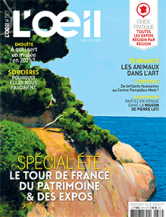Did Paris+ live up to your expectations?
DANIEL TEMPLON : We were expecting Paris+ to be buzzworthy. It was.The Art Basel brand is still as attractive as ever. Foreigners turned out in greater numbers than the other years. However, I have noticed that now people are choosing between Basel and Paris. Many collectors cannot attend both for scheduling reasons. That needs to be arbitrated. But we cannot truly assess the added value of Paris+, which is going to be called Art Basel Paris, until the fair returns to the Grand Palais next year.
You exhibit at fairs regularly. What percentage of your turnover do you earn at fairs?
D.T.: We participate in more than ten fairs a year, where we make between 40 and 50 % of our annual turnover. Showing at fairs is expensive. For example, the FIAC, now known as Paris+, rented an all-inclusive exhibition space of 64 m2 for approximately 80,000 euros. The Armory in New York City offers 90 m2 for 120 000 euros, and that entails 20 000 euros in transportation costs! It has become extremely expensive. So you have to sell a lot at each event. Each fair throughout the world has its own distinctive identity, and therefore corresponds with its own choice of artists and works. Some of them show expensive pieces, while others display quite affordable works. Despite the considerable cost, participating in art fairs has become essential. Within just a few days, we meet many more potential purchasers than we would in six weeks of exhibition at the gallery, even though my own gallery does get a lot of visitors. Moreover, these events make it possible for us to meet the artists – especially French artists – that foreigners cannot otherwise encounter.
Why did you participate in the Armory when you just opened a gallery in New York City?
D.T.: Opening in New York makes you a part of the essential continent for the art market. We can now reach hundreds of new collectors. The fact of being present on the American territory compels us to participate in the Armory, even though it is not a major fair. We’ll see what it becomes after it is taken over by Frieze. Perhaps the major New York galleries will come back. Some of them continue to believe that it is not necessary. When Leo Castelli was asked why he didn’t participate, he said, “In New York, every day is a fair.”
How is the market doing?
D.T.: They used to say that the worldwide economic crises affecting every sector of business through a chain reaction – the stock market, real estate, and so on, eventually reaching the art market – happen every seven years. Since 1991, we haven’t seen anything like that, fortunately, except for the recession of 2008. Optimism is still the order of the day. The globalisation of our market actually offers some protection. All wealth managers recommend buying art, even just as a small portion of one’s investments. The risk is minimal, if the choices are made wisely. Lately galleries have become small businesses in their own right, and many are managed by well-educated people. So the overall atmosphere is very satisfying. If a gallery isn’t viable and has to close, it’s because its owner is a poor business manager.
What do you think of the majority ownership acquisition of Colony in the capital of the Perrotin gallery?
D.T.: I’m baffled. By handing over 60 % of his capital to an investor – that’s what I read about in the press –, isn’t Emmanuel, whom I deeply respect, handing over his own independence? What if the shareholder interferes with the programming and, for example, asks the director to part with less “cost-effective” artists? In any case, he’ll be losing his independence, the freedom of choice that makes this profession enjoyable.
What motivates you to get up in the morning? How do you see the future?
D.T.: It probably won’t surprise you if I say that, after 57 years – after coffee and the news (“knowledge is power”) – my thoughts and my steps lead me to the gallery, where I always have so many new things to do. Like I was just saying, this profession is a labour of love on a daily basis, and it sets the pace for your entire existence. There is no age limit; there is no retirement.
What about the future of the gallery?
D.T.: Most galleries die when their founders die. I am fortunate to have a son who manages the gallery in New York, which we opened a year ago. He’ll be able to take over. But there’s no rush...
Cet article a été publié dans Le Journal des Arts n°618 du 6 octobre 2023, avec le titre suivant : Daniel Templon, gallery owner: "optimism is still the order of the day"








